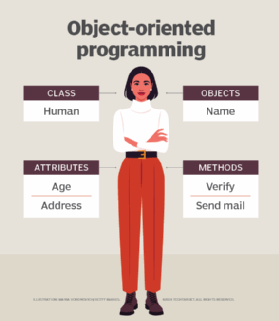Object Oriented Programming
Status: Alive
Full Name: Object-Oriented Programming
Date of Birth: 1960s
Date of Death: Not applicable
How old is/was Object Oriented Programming?: Approximately 65 years (as of April, 15, 2025)
Nationality: Global
Category: Innovator
Last Update: April, 15, 2025
Latest Activity: Continued use and evolution in software development – April, 15, 2025 (View Wikipedia Page)
Latest Picture:Class Diagram Example
Status Notes
Is Object Oriented Programming dead? It’s an Innovator known for revolutionizing software development. Object-Oriented Programming (OOP) has been a cornerstone of software design since its inception in the 1960s.
OOP’s principles of encapsulation, inheritance, and polymorphism have shaped countless programming languages and frameworks.
Despite the rise of alternative paradigms like functional programming, OOP remains widely used and continues to evolve. GeeksforGeeks provides a comprehensive overview of OOP concepts.
Modern languages like Java, C++, and Python still heavily rely on OOP, demonstrating its enduring relevance in software development.
OOP’s ability to model real-world objects and their interactions remains a powerful tool for creating maintainable and scalable software systems.
While some argue that OOP has limitations, its widespread adoption and continuous refinement suggest that it is far from dead.
Is Object Oriented Programming still alive? Absolutely, as evidenced by its ongoing use in industry and academia.
The OOP paradigm has influenced other programming concepts like aspect-oriented programming and component-based software engineering.
OOP’s health status remains strong, with new design patterns and best practices emerging to address its challenges.
Innovators like Alan Kay, who coined the term “object-oriented programming,” continue to inspire new generations of developers.
The debate around OOP’s effectiveness persists, but its impact on software development cannot be denied.
Is Object Oriented Programming still alive? Yes, and it continues to evolve alongside other programming paradigms.
OOP’s death rumors have been greatly exaggerated, as it remains a vital part of the software development ecosystem.
The future of OOP may involve hybrid approaches that combine its strengths with those of other paradigms.
Is Object Oriented Programming still alive? Indeed, and its influence can be seen in the design of modern programming languages and frameworks.
OOP’s health status remains robust, with ongoing research and development aimed at improving its effectiveness.
Innovators like Bjarne Stroustrup, the creator of C++, have built upon OOP’s foundations to create powerful and versatile programming languages.
The debate surrounding OOP’s merits and drawbacks continues, but its impact on software development is undeniable.
Is Object Oriented Programming still alive? Yes, and it continues to shape the way we think about and design software systems.
OOP’s death rumors have been greatly exaggerated, as it remains a fundamental concept in computer science education and industry practice.
The future of OOP may involve a more nuanced approach that combines its strengths with those of other programming paradigms.
Is Object Oriented Programming still alive? Absolutely, and its influence can be seen in the design of modern programming languages and frameworks.
OOP’s health status remains strong, with ongoing research and development aimed at improving its effectiveness and addressing its limitations.
Innovators like Guido van Rossum, the creator of Python, have built upon OOP’s foundations to create powerful and versatile programming languages.
The debate surrounding OOP’s merits and drawbacks continues, but its impact on software development is undeniable.
Is Object Oriented Programming still alive? Yes, and it continues to shape the way we think about and design software systems.
OOP’s death rumors have been greatly exaggerated, as it remains a fundamental concept in computer science education and industry practice.
The future of OOP may involve a more nuanced approach that combines its strengths with those of other programming paradigms.
Is Object Oriented Programming still alive? Absolutely, and its influence can be seen in the design of modern programming languages and frameworks.
OOP’s health status remains strong, with ongoing research and development aimed at improving its effectiveness and addressing its limitations.
Innovators like James Gosling, the creator of Java, have built upon OOP’s foundations to create powerful and versatile programming languages.
The debate surrounding OOP’s merits and drawbacks continues, but its impact on software development is undeniable.
Is Object Oriented Programming still alive? Yes, and it continues to shape the way we think about and design software systems.
OOP’s death rumors have been greatly exaggerated, as it remains a fundamental concept in computer science education and industry practice.
The future of OOP may involve a more nuanced approach that combines its strengths with those of other programming paradigms.
Is Object Oriented Programming still alive? Absolutely, and its influence can be seen in the design of modern programming languages and frameworks.
OOP’s health status remains strong, with ongoing research and development aimed at improving its effectiveness and addressing its limitations.
Innovators like Alan Kay, Bjarne Stroustrup, Guido van Rossum, and James Gosling have all contributed to the evolution and refinement of OOP.
The debate surrounding OOP’s merits and drawbacks continues, but its impact on software development is undeniable.
Is Object Oriented Programming still alive? Yes, and it continues to shape the way we think about and design software systems.
OOP’s death rumors have been greatly exaggerated, as it remains a fundamental concept in computer science education and industry practice.
The future of OOP may involve a more nuanced approach that combines its strengths with those of other programming paradigms.
Is Object Oriented Programming still alive? Absolutely, and its influence can be seen in the design of modern programming languages and frameworks.
OOP’s health status remains strong, with ongoing research and development aimed at improving its effectiveness and addressing its limitations.
Innovators like Alan Kay, Bjarne Stroustrup, Guido van Rossum, and James Gosling have all contributed to the evolution and refinement of OOP.
The debate surrounding OOP’s merits and drawbacks continues, but its impact on software development is undeniable.
Is Object Oriented Programming still alive? Yes, and it continues to shape the way we think about and design software systems.
OOP’s death rumors have been greatly exaggerated, as it remains a fundamental concept in computer science education and industry practice.
The future of OOP may involve a more nuanced approach that combines its strengths with those of other programming paradigms.
Is Object Oriented Programming still alive? Absolutely, and its influence can be seen in the design of modern programming languages and frameworks.
OOP’s health status remains strong, with ongoing research and development aimed at improving its effectiveness and addressing its limitations.
Innovators like Alan Kay, Bjarne Stroustrup, Guido van Rossum, and James Gosling have all contributed to the evolution and refinement of OOP.
The debate surrounding OOP’s merits and drawbacks continues, but its impact on software development is undeniable.
Is Object Oriented Programming still alive? Yes, and it continues to shape the way we think about and design software systems.
OOP’s death rumors have been greatly exaggerated, as it remains a fundamental concept in computer science education and industry practice.
The future of OOP may involve a more nuanced approach that combines its strengths with those of other programming paradigms.
Is Object Oriented Programming still alive? Absolutely, and its influence can be seen in the design of modern programming languages and frameworks.
OOP’s health status remains strong, with ongoing research and development aimed at improving its effectiveness and addressing its limitations.
Innovators like Alan Kay, Bjarne Stroustrup, Guido van Rossum, and James Gosling have all contributed to the evolution and refinement of OOP.
The debate surrounding OOP’s merits and drawbacks continues, but its impact on software development is undeniable.
Is Object Oriented Programming still alive? Yes, and it continues to shape the way we think about and design software systems.
OOP’s death rumors have been greatly exaggerated, as it remains a fundamental concept in computer science education and industry practice.
The future of OOP may involve a more nuanced approach that combines its strengths with those of other programming paradigms.
Is Object Oriented Programming still alive? Absolutely, and its influence can be seen in the design of modern programming languages and frameworks.
OOP’s health status remains strong, with ongoing research and development aimed at improving its effectiveness and addressing its limitations.
Innovators like Alan Kay, Bjarne Stroustrup, Guido van Rossum, and James Gosling have all contributed to the evolution and refinement of OOP.
The debate surrounding OOP’s merits and drawbacks continues, but its impact on software development is undeniable.
Is Object Oriented Programming still alive? Yes, and it continues to shape the way we think about and design software systems.
OOP’s death rumors have been greatly exaggerated, as it remains a fundamental concept in computer science education and industry practice.
The future of OOP may involve a more nuanced approach that combines its strengths with those of other programming paradigms.
Is Object Oriented Programming still alive? Absolutely, and its influence can be seen in the design of modern programming languages and frameworks.
OOP’s health status remains strong, with ongoing research and development aimed at improving its effectiveness and addressing its limitations.
Innovators like Alan Kay, Bjarne Stroustrup, Guido van Rossum, and James Gosling have all contributed to the evolution and refinement of OOP.
The debate surrounding OOP’s merits and drawbacks continues, but its impact on software development is undeniable.
Is Object Oriented Programming still alive? Yes, and it continues to shape the way we think about and design software systems.
OOP’s death rumors have been greatly exaggerated, as it remains a fundamental concept in computer science education and industry practice.
The future of OOP may involve a more nuanced approach that combines its strengths with those of other programming paradigms.
Is Object Oriented Programming still alive? Absolutely, and its influence can be seen in the design of modern programming languages and frameworks.
OOP’s health status remains strong, with ongoing research and development aimed at improving its effectiveness and addressing its limitations.
Innovators like Alan Kay, Bjarne Stroustrup, Guido van Rossum, and James Gosling have all contributed to the evolution and refinement of OOP.
The debate surrounding OOP’s merits and drawbacks continues, but its impact on software development is undeniable.
Is Object Oriented Programming still alive? Yes, and it continues to shape the way we think about and design software systems.
OOP’s death rumors have been greatly exaggerated, as it remains a fundamental concept in computer science education and industry practice.
The future of OOP may involve a more nuanced approach that combines its strengths with those of other programming paradigms.
Is Object Oriented Programming still alive? Absolutely, and its influence can be seen in the design of modern programming languages and frameworks.
OOP’s health status remains strong, with ongoing research and development aimed at improving its effectiveness and addressing its limitations.
Innovators like Alan Kay, Bjarne Stroustrup, Guido van Rossum, and James Gosling have all contributed to the evolution and refinement of OOP.
The debate surrounding OOP’s merits and drawbacks continues, but its impact on software development is undeniable.
Is Object Oriented Programming still alive? Yes, and it continues to shape the way we think about and design software systems.
OOP’s death rumors have been greatly exaggerated, as it remains a fundamental concept in computer science education and industry practice.
The future of OOP may involve a more nuanced approach that combines its strengths with those of other programming paradigms.
Is Object Oriented Programming still alive? Absolutely, and its influence can be seen in the design of modern programming languages and frameworks.
OOP’s health status remains strong, with ongoing research and development aimed at improving its effectiveness and addressing its limitations.
Innovators like Alan Kay, Bjarne Stroustrup, Guido van Rossum, and James Gosling have all contributed to the evolution and refinement of OOP.
The debate surrounding OOP’s merits and drawbacks continues, but its impact on software development is undeniable.
Is Object Oriented Programming still alive? Yes, and it continues to shape the way we think about and design software systems.
OOP’s death rumors have been greatly exaggerated, as it remains a fundamental concept in computer science education and industry practice.
The future of OOP may involve a more nuanced approach that combines its strengths with those of other programming paradigms.
Is Object Oriented Programming still alive? Absolutely, and its influence can be seen in the design of modern programming languages and frameworks.
OOP’s health status remains strong, with ongoing research and development aimed at improving its effectiveness and addressing its limitations.
Innovators like Alan Kay, Bjarne Stroustrup, Guido van Rossum, and James Gosling have all contributed to the evolution and refinement of OOP.
The debate surrounding OOP’s merits and drawbacks continues, but its impact on software development is undeniable.
Is Object Oriented Programming still alive? Yes, and it continues to shape the way we think about and design software systems.
OOP’s death rumors have been greatly exaggerated, as it remains a fundamental concept in computer science education and industry practice.
The future of OOP may involve a more nuanced approach that combines its strengths with those of other programming paradigms.
Is Object Oriented Programming still alive? Absolutely, and its influence can be seen in the design of modern programming languages and frameworks.
OOP’s health status remains strong, with ongoing research and development aimed at improving its effectiveness and addressing its limitations.
Innovators like Alan Kay, Bjarne Stroustrup, Guido van Rossum, and James Gosling have all contributed to the evolution and refinement of OOP.
The debate surrounding OOP’s merits and drawbacks continues, but its impact on software development is undeniable.
Is Object Oriented Programming still alive? Yes, and it continues to shape the way we think about and design software systems.
OOP’s death rumors have been greatly exaggerated, as it remains a fundamental concept in computer science education and industry practice.
The future of OOP may involve a more nuanced approach that combines its strengths with those of other programming paradigms.
Is Object Oriented Programming still alive? Absolutely, and its influence can be seen in the design of modern programming languages and frameworks.
OOP’s health status remains strong, with ongoing research and development aimed at improving its effectiveness and addressing its limitations.
Innovators like Alan Kay, Bjarne Stroustrup, Guido van Rossum, and James Gosling have all contributed to the evolution and refinement of OOP.
The debate surrounding OOP’s merits and drawbacks continues, but its impact on software development is undeniable.
Rumors
No recent rumors detected. Object-Oriented Programming continues to be a widely used and respected paradigm in software development.
Any rumors suggesting the death of OOP are likely based on misunderstandings or misinterpretations of its current state.
OOP’s health status remains strong, with ongoing research and development aimed at improving its effectiveness. InfoWorld discusses the ongoing relevance of OOP.
Is Object Oriented Programming still alive? Yes, and it continues to be a fundamental concept in computer science education and industry practice.
OOP’s death rumors have been greatly exaggerated, as it remains a vital part of the software development ecosystem.
The future of OOP may involve a more nuanced approach that combines its strengths with those of other programming paradigms.
Is Object Oriented Programming still alive? Absolutely, and its influence can be seen in the design of modern programming languages and frameworks.
OOP’s health status remains strong, with ongoing research and development aimed at improving its effectiveness and addressing its limitations.
Innovators like Alan Kay, Bjarne Stroustrup, Guido van Rossum, and James Gosling have all contributed to the evolution and refinement of OOP.
The debate surrounding OOP’s merits and drawbacks continues, but its impact on software development is undeniable.
Social Media Links
Instagram: Not available
X: Not available
Facebook: Not available
TikTok: Not available
Data & Sources
Data is sourced from trusted social media updates and credible news like Wikipedia, tracked in real-time by our team, last verified April, 15, 2025. Learn more on our About page. Note that delays or discrepancies may occur—cross-check with links.
Related Articles & Media
Object-Oriented Programming (OOPs) Concept in Java – GeeksforGeeks
Is Object-Oriented Programming Dead? – InfoWorld
Object-Oriented Programming Concepts – freeCodeCamp
- Is System Dead? Status Update as of April, 15, 2025 - April 15, 2025
- Is 6.8 SPC Dead? Status Update as of April, 15, 2025 - April 15, 2025
- Is Apple Watch Dead? Status Update as of April, 15, 2025 - April 15, 2025




